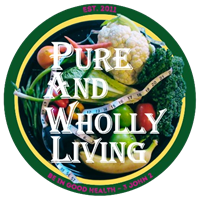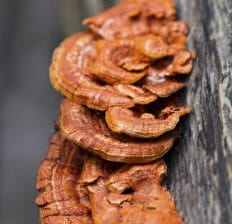When it comes to sticking to a healthy diet, disease-fighting mushrooms check off all the boxes: They’re low in carbohydrates and calories, but a great source of B vitamins, trace minerals, fiber and even protein. They also an anti-inflammatory food, containing high levels of beta-glucans compounds that keep immune cells alert, plus a powerful antioxidant called ergothioneine that helps lower bodywide inflammation.
Here are the major types of disease-fighting mushrooms you should try to regularly include in your diet for their protective, immune-enhancing effects:
Reishi
Reishi mushrooms have been used for thousands of years as a way to fight chronic disease. Today, we know from scientific studies that they’re in fact capable of doing what the Chinese have always speculated they could: fighting inflammation, cancer, heart disease, hormonal imbalances, neuro-degenerative problems, mood disorders and more.
Reishi mushrooms, a type of bitter, woody fungi, are known as one of the top natural superfoods in existence. Reishi mushrooms are a type of powerful adaptogen that help the body deal with stress, whether physical or psychological, so they’re a natural remedy for anxiety.
When taken in tincture, capsule or tablet form, they have the unique ability to increase energy and also bring on a feeling of calm at the same time, making them an all-around mood booster and “brain food.” They can help heal adrenal fatigue and are sometimes called the “medicine of kings” because they can improve memory and concentration while also helping bust stress and facilitate restful sleep.
How do reishi mushrooms do so much? Their beta-glucans increase the immune system’s T-cell levels, which means they help lower inflammatory responses caused by stress, stimulants, a poor diet or other environmental factors. This is especially beneficial for people suffering from immune disorders or adrenal or chronic fatigue.
This immune boost that you receive from reishi mushrooms can help reduce cancer cell growth and the spread of tumors, but that’s not all — they also contain ganoderic acids that lower cholesterol, triglyceride levels and blood pressure, as well as reduce the risk of blood clots and even help correct heart arrhythmia. Reishis also contain lanostan, an antihistamine that can act as a natural arthritis cure and also soothe muscle aches.
Shiitake
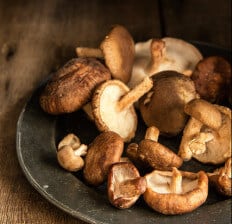
Shiitakes contain many chemical compounds that protect your DNA from oxidative damage — for example, lentinan, a substance that can heal chromosome damage caused by anti-cancer treatments. In Japan, shiitake mushrooms provide this special chemical component known as lentinan, which is used to prolong longevity and act as a natural treatment for cancer.
Eritadenine substances are also found in shiitakes, which help reduce cholesterol levels, while lentinula edodes mycelium (LEM) helps prevent and treat cancer (especially of the stomach and digestive organs), heart disease, hepatitis, high blood pressure and infectious diseases.
In addition, revealed in the Journal of Nutrition, shiitake mushroom nutrition benefits include antiviral, antibacterial and antifungal effects, as well as helping to control blood sugar and reduce the symptoms of inflammatory diseases. (5) Shiitakes are also unique for a plant since they contain all eight essential amino acids along with a type of essential fatty acid called linoleic acid. Look for them in most grocery stores, especially Asian markets.
Cordyceps

These are sometimes known as anti-aging mushrooms since they can help increase stamina and endurance due to their ability to help the body produce ATP, the primary fuel our bodies run on. In fact, in Chinese folk medicine they’re known to be “invigorants” and believed to act as a gentle stimulant, a tonic and an adaptogen used to increase energy and reduce fatigue.
They also act as protectors of mitochondria by scavenging reactive oxygen species, inhibiting mitochondrial swelling and increasing the activities of antioxidant substances, which makes them a natural anti-aging food. (6)
Similar to reishi mushrooms, numerous studies find that cordyceps mushrooms can help as a natural cancer remedy by inhibiting cancer cell division and growth. Cordyceps interfere with how cancer cells make proteins and stop metastatic spread of cancerous tumors. They’re usually hard to find fresh, so look for them dried or in capsule or tablet form.
Maitake
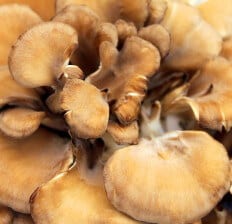
In addition to being loaded with vitamins, maitake mushroom nutrition benefits are due to special polysaccharide components called beta-1,6 glucan, which stimulates the immune system. Many of maitake’s compounds are even classified as host defense potentiators and are used in Asia as an adjunctive treatment for cancer. They can even help minimize toxic effects of radiation or chemotherapy.
In studies, maitake mushroom nutrition is linked to enhanced immunity and the ability to balance hormones naturally and reduce the growth of cancerous tumors. Maitake mushrooms have even improved the health of AIDS patients and the blood sugar levels of diabetics. They may also reduce hypertension and protect people from heart disease.
Oyster
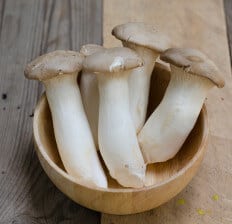
Oyster mushroom nutrition benefits include the ability to naturally reduce joint pain and muscle aches due to their anti-inflammatory effects — for example, they’re shown to reduce tightness in tendons. They’re also a heart-healthy fungus with the ability to strengthen blood vessel walls and lower the risk for heart attack or a stroke.
Additionally, they’re an excellent way to address a possible iron deficiency, especially if you don’t eat much meat, which can help prevent anemia, low energy, poor concentration and weakness. Oyster mushrooms are available at certain spatiality food stores, in dried mushroom packages or at some farmers markets.
Cremini/White Button Mushrooms
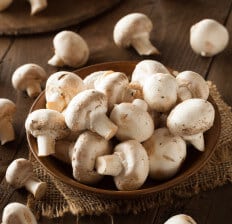
You might suspect that the tasty, familiar mushrooms in your grocery store aren’t very valuable — but think again. What may surprise you is just how many benefits of cremini (or white button) mushrooms are proven in studies.
These ordinary mushrooms are super dense with nutrients, including having more copper, potassium, protein and selenium than either oyster or shiitake mushrooms. They’re also a good source of phosphorus, zinc, niacin and pantothenic acid, especially when you cook them down and eat more than one cup at a time.
Research shows that extracts from creminis can reduce hormonal imbalances and prevent hormone-dependent types of cancer, especially breast cancer. A benefit of cremini mushroom nutrition is the high source of conjugated linolenic acid, which is a type of fatty acid that controls the production of estrogen and can stop cancerous tumor growth in some instances by blocking certain enzymes’ effects.
Similar to white mushrooms, porcinis, portabellas and morels are also mushrooms loaded with nutrients and antioxidants, so include in these recipes often too.
Source: Dr. Axe
